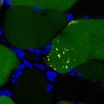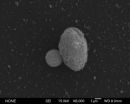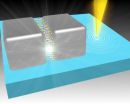(Press-News.org) Washington, DC — New research appearing in the April 9 issue of the Journal of Neuroscience highlights the important role sleep plays in strengthening and maintaining the accuracy of a memory and hints at why the brain shuts out sensory information during periods of deep sleep. The study found that introducing new odor information to an animal while it sleeps compromises its ability to remember the difference between new and previously encountered smells while awake.
During sleep, the brain performs a number of important repair and maintenance duties that are necessary for normal functioning, including moving information from short-term to long-term memory. Previous studies show that the "replay" of recently learned information during sleep plays an important role in memory storage. However, it was unknown whether introducing new information during slow-wave sleep (SWS) — a phase of deep sleep during which the brain's sensory systems are far less responsive to external stimuli — affects memory.
In the current study, Dylan Barnes and Donald Wilson, PhD, of the City University of New York, the Nathan Kline Institute for Psychiatric Research, and New York University Langone Medical School exposed rats to new and previously encountered odor information while the animals slept. To precisely control the animals' odor experience during periods of wakefulness and sleep, the researchers delivered electrical stimulation to brain circuits involved in odor processing rather than relying on the delivery of real odors to the animals.
Exposure to new odor information during sleep made it more difficult for the animals to distinguish the learned odor from the other odors. "While previous work has demonstrated the role of sleep replay on memory strength, these are the first data to show that memory accuracy can also independently be influenced during sleep," Wilson said.
Before introducing odor information to the animals as they slept, Barnes and Wilson taught the animals to associate specific odor information with a mild foot shock while they were awake. After the animals learned to make the association between the odor experience and shock (demonstrated by enhanced fearful behavior), Barnes and Wilson recreated the odor experience when the animals were in SWS.
Animals that received a replay of the learned odor experience during SWS demonstrated increased memory for the odor compared with animals that received a similar replay of the odor while awake. In contrast, the animals that received a replay of new odor information as they slept demonstrated greater difficulty distinguishing the learned odor they were previously exposed to from others.
"We know that during slow-wave sleep, the brain's sensory systems are far less responsive to normal inputs," Wilson said. "Our data suggest this sensory isolation may help allow replay of learned information in the absence of external interference, providing strong, precise memory of important information."
Jan Born, PhD, a neuroscientist who studies sleep at the University of Tübingen and was not involved in this research, noted such information may one day prove important for efforts to reduce traumatic memories. "The question of whether cueing memories during sleep, and specifically during slow-wave sleep, can be used to modify specific memories is currently a hot topic due to the potential for such information to lead us to new ways to weaken the unwanted memories commonly found in psychiatric conditions such as post-traumatic stress and anxiety disorders," he explained.
INFORMATION:
This research was funded by the National Institute on Deafness and Other Communication Disorders.
The Journal of Neuroscience is published by the Society for Neuroscience, an organization of nearly 40,000 basic scientists and clinicians who study the brain and nervous system. Wilson can be reached at donald.wilson@nyumc.org. More information on smell, sleep, and memory can be found on BrainFacts.org.
Processing new information during sleep compromises memory
Animal study highlights importance of brain activity during sleep for memory accuracy, strength
2014-04-09
ELSE PRESS RELEASES FROM THIS DATE:
Language structure ... you're born with it
2014-04-09
Humans are unique in their ability to acquire language. But how? A new study published in the Proceeding of the National Academy of Sciences shows that we are in fact born with the basic fundamental knowledge of language, thus shedding light on the age-old linguistic "nature vs. nurture" debate.
THE STUDY
While languages differ from each other in many ways, certain aspects appear to be shared across languages. These aspects might stem from linguistic principles that are active in all human brains. A natural question then arises: are infants born with knowledge of how ...
Lead continues to be a serious threat to California condor populations
2014-04-09
The California condor was one of the first species to be listed under the Endangered Species Preservation Act in 1966 when the population was reduced to a handful of birds. Through a massive collaborative effort that included fieldwork and breeding in zoos, the condor population has grown to more than 400 birds, more than half of which are now free-flying in the wild. Unfortunately, there is overwhelming evidence that lead poisoning from accidental ingestion of spent ammunition is the leading cause of death in the wild population, and this may prevent the establishment ...
Identified a new possible target to combat muscle wasting
2014-04-09
In the study published today in the Journal of Clinical Investigation (JCI), one of the journals with highest impact in experimental medicine, the researchers associate the activity of the DOR protein with muscle atrophy and point to DOR as a plausible target against which to develop a drug to prevent muscle deterioration in certain diseases.
DOR (Diabetes- and Obesity-regulated gene), also known as TP53INP2, is a protein involved in autophagy, a quality control process that ensures cells stay healthy. The researchers have found that increased DOR expression in the muscle ...
UNC researchers show how cancer cells may respond to mechanical force
2014-04-09
April 9, 2014 The push and pull of physical force can cause profound changes in the behavior of a cell. Two studies from researchers working at the UNC Lineberger Comprehensive Cancer Center reveal how cells respond to mechanical manipulation, a key factor in addressing the underlying causes of cancer and other diseases.
The studies, published in Nature Cell Biology and the Journal of Immunology, have their roots in a longtime partnership between the labs of Keith Burridge, PhD, Kenan Professor of Cell Biology and Physiology in the UNC School of Medicine, and Richard ...
Study examines mental health toll exacted on civilians working with military in war zones
2014-04-09
WASHINGTON, DC, April 9, 2014 — The punishing psychological toll endured by military personnel in war zones has been extensively documented for years by researchers, perhaps more than ever in the wake of recent military engagements in Iraq and Afghanistan.
But there has been a troubling dearth of research examining the mental health toll exacted on the large numbers of civilians who work with the military in war zones.
Sociologists Alex Bierman, an assistant professor at the University of Calgary, and Ryan Kelty, an associate professor at Washington College in Maryland, ...
Scientists in Singapore develop novel ultra-fast electrical circuits using light-generated tunneling
2014-04-09
Singapore, 9 April 2014 – Assistant Professor Christian A. Nijhuis of the Department of Chemistry at the National University of Singapore's (NUS) Faculty of Science, in collaboration with researchers from the Agency for Science, Technology and Research (A*STAR), namely Dr Bai Ping of the Institute of High Performance Computing and Dr Michel Bosman of the Institute of Materials Research and Engineering has successfully designed and fabricated electrical circuits that can operate at hundreds of terahertz frequencies, which is tens of thousands times faster than today's state-of-the-art ...
Physical function and sense of autonomy determine life-space mobility in older people
2014-04-09
Physical function and sense of autonomy are independent determinants of life-space mobility in older people. This was found in a study conducted at the Gerontology Research Center of the University of Jyväskylä. In this project, 848 older men and women that lived independently in the Jyväskylä region in Central Finland were interviewed at their own home.
Life-space mobility reflects a person's mobility with or without the use of a vehicle. Life-space mobility reflects an individual's opportunities to participate in the society. An individual's life-space may be restricted ...
Technical tests of biodiversity
2014-04-09
What happens when physicists play (using mathematical instruments) with the genetics of populations? They may discover unexpected connections between migration and biodiversity, for example, as recently done by a group of researchers from the International School for Advanced Studies (SISSA) in Trieste and the Polytechnic University in Turin in a study published in the journal Physical Review Letters.
The effect of migration on biodiversity (intended as the coexistence of different genetic traits) is an open question: does migration increase or decrease the genetic variability ...
Brain size influences development of individual cranial bones
2014-04-09
VIDEO:
This shows skull and skeletal development of a 25-year-old musk shrew embryo.
Click here for more information.
Embryonic development in animals – except mice and rats – remains largely unexplored. For a research project at the University of Zurich, the embryos of 134 species of animal were studied non-invasively for the first time using microcomputer imaging, thus yielding globally unique data. The embryos studied came from museum collections all over the world. The international ...
USA top in the world for entrepreneurship
2014-04-09
The USA is the most entrepreneurial economy in the world, according to the 2014 Global Entrepreneurship and Development Index (GEDI). (See Notes to Editors for the complete rankings.)
The GEDI index combines data on entrepreneurial activities and aspirations with data describing how well the country supports entrepreneurial activity in the US and 119 other countries across the world.
The USA came top, followed by Australia and Sweden in second and third place, respectively.
The researchers found that the USA is a world leader when it comes to financing new businesses ...
LAST 30 PRESS RELEASES:
Yale study challenges notion that aging means decline, finds many older adults improve over time
Korean researchers enable early detection of brain disorders with a single drop of saliva!
Swipe right, but safer
Duke-NUS scientists identify more effective way to detect poultry viruses in live markets
Low-intensity treadmill exercise preconditioning mitigates post-stroke injury in mouse models
How moss helped solve a grave-robbing mystery
How much sleep do teens get? Six-seven hours.
Patients regain weight rapidly after stopping weight loss drugs – but still keep off a quarter of weight lost
GLP-1 diabetes drugs linked to reduced risk of addiction and substance-related death
Councils face industry legal threats for campaigns warning against wood burning stoves
GLP-1 medications get at the heart of addiction: study
Global trauma study highlights shared learning as interest in whole blood resurges
Almost a third of Gen Z men agree a wife should obey her husband
Trapping light on thermal photodetectors shatters speed records
New review highlights the future of tubular solid oxide fuel cells for clean energy systems
Pig farm ammonia pollution may indirectly accelerate climate warming, new study finds
Modified biochar helps compost retain nitrogen and build richer soil organic matter
First gene regulation clinical trials for epilepsy show promising results
Life-changing drug identified for children with rare epilepsy
Husker researchers collaborate to explore fear of spiders
Mayo Clinic researchers discover hidden brain map that may improve epilepsy care
NYCST announces Round 2 Awards for space technology projects
How the Dobbs decision and abortion restrictions changed where medical students apply to residency programs
Microwave frying can help lower oil content for healthier French fries
In MS, wearable sensors may help identify people at risk of worsening disability
Study: Football associated with nearly one in five brain injuries in youth sports
Machine-learning immune-system analysis study may hold clues to personalized medicine
A promising potential therapeutic strategy for Rett syndrome
How time changes impact public sentiment in the U.S.
Analysis of charred food in pot reveals that prehistoric Europeans had surprisingly complex cuisines
[Press-News.org] Processing new information during sleep compromises memoryAnimal study highlights importance of brain activity during sleep for memory accuracy, strength



